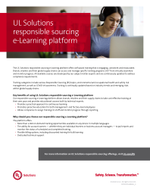
RCP-RS-EN-_Overview_InfoSheet.pdf
Gain visibility into the working conditions in your supply chain with SMETA audits and other social audits for Sedex members.

As an Affiliate Audit Company (AAC) for Sedex, UL Responsible Sourcing has the ability to perform SMETA audits in more than 120 countries. Drawing from more than 25 years of industry knowledge and best practices, our global network of specialists is well prepared to conduct social audits that help you ensure responsible business practices in your supply chain.
The Sedex Members Ethical Trade Audit (SMETA) Audit is a standardized social audit conducted on behalf of clients that are members of Sedex (Supplier Ethical Data Exchange). Originally created by the Sedex Associate Auditor Group (AAG), now renamed the Sedex Stakeholder Forum (SSF), it draws from practices defined by Sedex members and by the Global Social Compliance Programme (GSCP). SMETA involves multi-stakeholder consultation and is intended to provide a centrally agreed audit protocol that can be confidently shared.
As an increasing number of clients accept this form of social audit, SMETA allows you to potentially avoid conducting multiple site audits for different clients. SMETA applies to all sizes and types of employment sites, including manufacturing sites, agricultural sites and service providers. For specific supply chain circumstances, SMETA Supplements can be used for a tailored approach service for service providers, private employment agencies and multi-site audits.
The flexibility of the Sedex platform gives factories ownership of their social audit program and audit report. Factories and suppliers that pay for the audit can own their audit report and share it with one or multiple clients.
Additionally, conducting SMETA audits can provide beneficial outcomes, including:
The Sedex platform allows audited sites to avoid massive email exchanges and directly share the final audit report and any corrective actions.
In addition, if required by the audited site, the AAC that conducted the audit can conduct a desktop review for applicable noncompliance.
For retailers and end clients, the Sedex platform is a database that can allow them to map their supply chain and monitor their compliance program.
SMETA audits are conducted to inspect a company’s site, its processes, documentation and systems.
SMETA audits are conducted against two or four auditing pillars.
The two mandatory pillars for SMETA audits are Labor Standards (including Child Labour, Freedom of Association, Working Hours, Living Wage, Discrimination, etc.) and Health and Safety.
The 4-Pillar audit includes the elements of the 2-Pillar audit with the addition of the Environment (extended edition) pillar and Business Ethics pillar. In the case of the 4-Pillar audit, the extended Environment Assessment replaces the shortened assessment included in the 2-Pillar audit.
Our responsible sourcing experts leverage more than 25 years of industry experience with a global footprint. We take pride in offering high quality auditor competency training, evaluations, quality control and monitoring of integrity with the aim of providing the most thorough audit in the industry. Our global network of specialists compiles comprehensive databases of country labor regulatory profiles, annual social responsibility risk indices and global wage data.
Factories usually look for an audit scheme that is widely recognized and also accepted by their current clients. UL Solutions generally introduces the most common schemes in the responsible sourcing fields such as the Amfori-BSCI, ICS, SLCP and others.
In addition to helping clients develop a responsible sourcing program to fit their needs, UL Solutions supports the SMETA audit and other relevant global third-party audit programs.

RCP-RS-EN-_Overview_InfoSheet.pdf

RCP-RS-EN-e-Learning-Infosheet.pdf